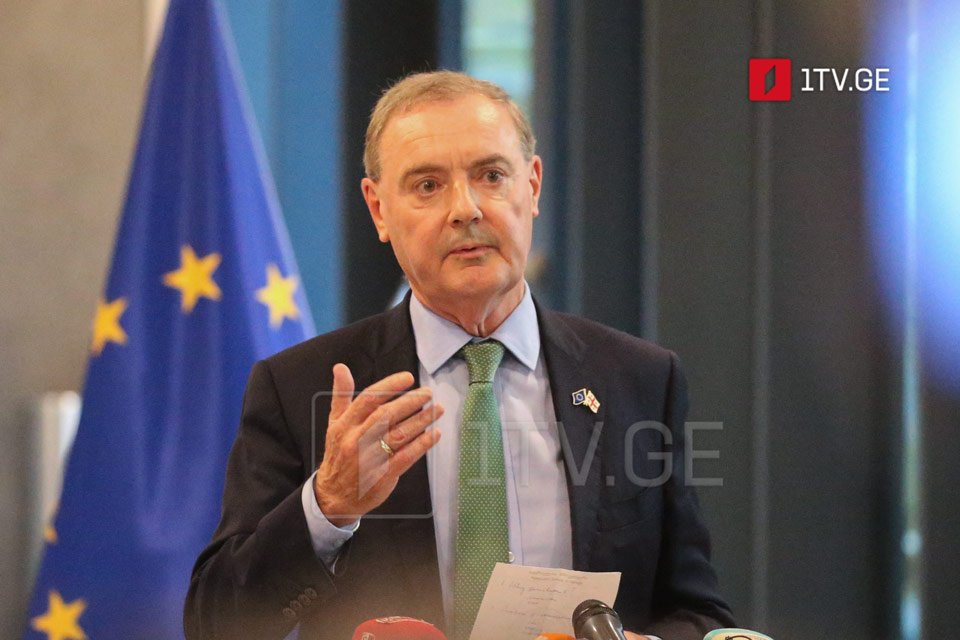
“Georgia is taking very seriously its commitment not to allow its territory to be used for the circumvention of sanctions, whether that is trade in goods, particularly the 38 battlefield products or financial services,” said EU Sanctions Envoy, David O’Sullivan, who is visiting Georgia with his US and UK colleagues.
Asked whether he could confirm that there was not a single case of sanctions evasion, the EU official said: “I would love to be able to say that there’s anywhere where there’s not a single case of sanctions evasion. Whether there are sanctions, there is evasion. What I can say is that the measures which have been put in place here are a very solid guarantee that circumvention will not take place.”
“Georgia, for the reasons I have already mentioned, is not aligning with our sanctions and is not implementing our sanctions. But from what we have been able to see over the last two days, Georgia is taking very seriously its commitment not to allow its territory to be used for the circumvention of sanctions, whether that is trade in goods, particularly the 38 battlefield products or financial services.
I mean, there are various ways in which people can try to evade sanctions, whether that’s at customs points or false declarations. And the Georgian authorities have put in place, as I say very impressive measures of trying to monitor this and make sure that it doesn’t happen,” he noted.
As for the following question about Russia’s recent move to resume direct flights with Georgia, David O’Sullivan responded that “the Georgia authorities have assured us that to the extent there are new entry points created; they will indeed make sure that there are the same strict controls that these new entry points as at the existing.”
“Any crossing point is a potential weak spot in sanctions implementation of course. But I don’t think this is a weaker spot here in Georgia than it is in any other country which has a land border. Maybe it’s not as like a political violation, but what risks do we save here in economics? We have no desire to undermine or prevent the legitimate trade between Georgia and Russia. There are many products which are not sanctioned particularly, for example, in the agricultural area. There is no reason why these exports should not continue.
As for the medium to long term, I fear that the prospects of the Russian economy are not particularly promising in light of the impact of the sanctions. And I do think that the sanctions will remain in place for quite some time even if we were to imagine an early cessation of hostilities, which doesn’t seem particularly lightly at the moment, I have to say, unfortunately, there will be so many other issues to be resolved with Russia, that in my view, these sanctions are going to be here for five, 10 years. And we’re all going to have to learn to live with managing that. And this is ultimately going to slow down the Russian economy and see a shrinking of the Russian economy unfortunately, and a loss of prosperity for the Russian people. But that is a consequence of the political choices, which Mr. Putin has made.
I’m not here to advise the Georgian government or Georgian businesses as to where their future prospects best lie. What is clear to me is that if you look to the future, I think trade with Europe offers a better perspective than trade with Russia. I repeat both on the issue of dual-use and on the issue of the 38 Battlefield products, we are very satisfied with the systems of checking and monitoring, which the Georgian authorities have put in place to make sure that these products do not find their way to Russia from this country,” he told the reporter.
On the issue of the newly introduced sanctions on automobiles, David O’Sullivan went on to say that “If people in Georgia were to be importing European automobiles with a view to selling them to Russia, that would indeed be a circumvention. We have no evidence that that is the case for the moment, but I think the Georgian authorities are alerted to this issue, and we will be following closely how this develops in the coming weeks and months.”
EU Sanctions Envoy explained what those 38 products entail, mentioning electronic components, integrated circuits, chips, flash, memory cards, and in some cases, camera, and vision equipment, “which the Ukrainian authorities have found on the battlefield in missiles, drones, and shells, and which we, therefore, wish to make sure no longer find their way to Russia so that they can be used in lethal weapons to kill innocent Ukrainians.”
“That is the purpose of this list, and that is why we are particularly focused on circumvention in this area. Other list we have is the economically critical goods, which are mainly industrial goods, which can be used to support the Russian military effort, but not directly in the form of weapons. But this is why we’re focused on these 38 products, which do find their way into lethal weapons. And we wish, absolutely wish to stop this lethal trade,” he explained.





